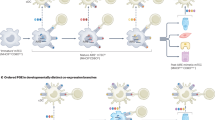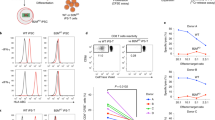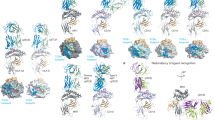Abstract
RESULTS from three distinct experimental systems indicate that, except for lymphocytes reacting to alloantigens, interaction between sensitised thymus-derived lymphocytes (T cells) and other somatic cells occurs only in syngeneic or semiallogeneic systems. First, histoincompatible T cells do not function as helpers for antibody-forming cell precursors (B cells)1,2. Second, maximal proliferation of lymphocytes (presumably T cells) resulting from exposure in vitro of sensitised guinea pig lymphocytes to antigen-pulse macrophages is observed only when the two cell types share major histocompatibility antigens3. Third, cell-mediated lysis of fibroblasts or macrophages infected with lymphocytic choriomeningitis (LCM) virus, a function of specifically sensitised T cells, occurs only when lymphocyte and target cells share at least one set of H-2 antigenic specificities4,5. The phenomenon is unaffected by differences either in minor histocompatibility antigens, or at the M locus.
This is a preview of subscription content, access via your institution
Access options
Subscribe to this journal
Receive 51 print issues and online access
$199.00 per year
only $3.90 per issue
Buy this article
- Purchase on SpringerLink
- Instant access to the full article PDF.
USD 39.95
Prices may be subject to local taxes which are calculated during checkout
Similar content being viewed by others
References
Kindred, B., and Shreffler, D. C., J. Immun., 109, 940 (1972).
Katz, D. H., Hamaoka, T., and Benecerraf, B., J. exp. Med., 137, 1405 (1973).
Rosenthal, A. S., and Shevach, E. M., J. exp. Med., 138, 1194 (1973).
Doherty, P. C., and Zinkernagel, R. M., Transplantn Rev., 18 (in the press).
Zinkernagel, R. M., and Doherty, P. C., Nature, 248, 701 (1974).
Lane, F. C., and Unanue, E. R., J. exp. Med., 135, 1104 (1972).
Blanden, R. V., and Langman, R. E., Scand. J. Immun., 1, 379 (1972).
North, R. J., J. exp. Med., 138, 342 (1973).
Mackaness, G. B., J. exp. Med., 116, 381 (1962).
Mackaness, G. B., J. exp. Med., 129, 973 (1969).
Festenstein, H., Transplantn Rev., 15, 62 (1973).
Krahenbuhl, J. L., and Remington, J. S., J. infect. Immun., 4, 337 (1971).
Jones, T., and Youmans, G. P., Cell Immun., 9, 353 (1973).
Merigan, T. C., Science, 145, 811 (1964).
Baron, S., Babar, S., and Buckler, C. E., Science, 145, 819 (1969).
Youngner, J. S., and Salvin, S. B., J. Immun., 111, 1914 (1973).
Katz, D. H., and Unanue, E. R., J. exp. Med., 127, 967 (1972).
Kapp, J. A., Pierce, C. W., and Banecerraf, B., J. exp. Med., 138, 1121 (1973).
Author information
Authors and Affiliations
Rights and permissions
About this article
Cite this article
ZINKERNAGEL, R. Restriction by H-2 gene complex of transfer of cell-mediated immunity to Listeria monocytogenes. Nature 251, 230–233 (1974). https://doi.org/10.1038/251230a0
Received:
Issue date:
DOI: https://doi.org/10.1038/251230a0
This article is cited by
-
CD4 and CD8 T lymphocyte interplay in controlling tumor growth
Cellular and Molecular Life Sciences (2018)
-
From antigen processing to peptide-MHC binding
Nature Immunology (2006)
-
A plea for listeriosis research
Infection (1988)
-
Virulence of different strains ofListeria monocytogenes serovar 1/2a
Medical Microbiology and Immunology (1984)



